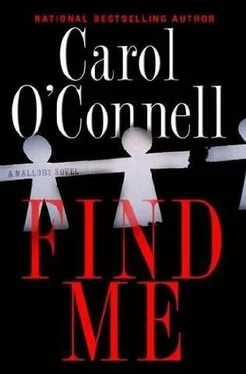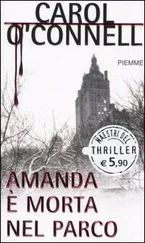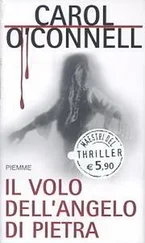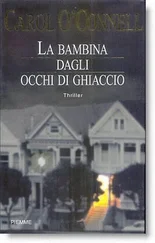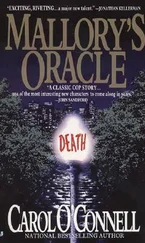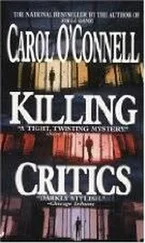Riker was not inclined to trust the moles with the lives of any more people. He ordered Charles Butler to change lanes and drop back to the end of a parade that stretched out for more than a mile. And now he watched for exit signs and more defections to Route 66, but all the parents seemed content to drive I-40 to their next interview with the reporters.
The radio was tuned to a news station, and the broadcaster was giving a traffic report on the caravan, “-so travelers should avoid that stretch of the interstate. Our helicopter counts two hundred and seventy-five cars going slower than the legal limit.”
Understatement.
The speedometer on the Mercedes was showing forty-five miles an hour and falling. The highway was hemorrhaging with the caravan, yet the traffic report had not deterred the local residents. All along the road were groups of people lining the prairie with cars and trucks, picnic baskets and babies in arms, young and old, waving at the cars driving by. Some held up signs of good luck and God love you lettered in bold print that Riker could read without glasses; there was nothing wrong with his long-distance vision, and so he was also able to see the first paper airplane take flight. It was caught by a tall man standing with his family. As the Mercedes rolled by, the airplane was unfolded in the Texan’s hands. It was a poster of a missing child.
The news helicopter relayed this sight to the radio broadcaster as more paper planes took flight. Flocks of them sailed out from the windows of the caravan vehicles. The reporter was calling it a swarm-so many of them. Some soared upward, and others were captured by high-reaching hands and the lower reach of chasing children. Little ships with big hopes.
Mallory’s store of coveted cell-phone numbers included one for Harry Mars, and her call went through to voice mail. She planned to trade on a cop’s good name-not her name, and so she left the message, “It’s Markowitz’s daughter.”
She felt a pang, and supposed that it was guilt or something like it, and this was not the first time since leaving New York City. Now and again, she felt that she was cheating on the man who had raised her from the age of ten. It was the music that called him to mind, again and again, all along this road.
Music was all her two fathers had in common. Louis Markowitz had never been young-except late in the evening after supper, when the volume on the stereo was cranked up high, and the old man had taught her to dance to rock ’n’ roll. His wife, gentle Helen, had called him a dancing fool and took her own turns with him on a floor with a pulled-back rug. Some of Mallory’s favorite memories were the dancing nights.
Lou Markowitz had lived to dance.
Peyton Hale had lived to drive. Cassandra had told her that defining detail about her real father, but not much else. Or had she? Mallory had been six going on seven the day her mother died. How many memories had been lost? She had always known her father’s name and where her green eyes had come from, though her mother had not kept any photographs, probably wanting no reminder of parting with him and the loss of him.
Before the visit from Savannah Sirus, she had known nothing of her mother’s pain. It must have been reborn every morning when young Kathy jumped up and down on her mother’s bed, waking Cassandra with Peyton’s green eyes.
Another pang.
Her cell phone beeped.
The restaurant’s parking lot would not hold all the vehicles. Reporters and FBI agents had arrived first to take up most of the spaces. Riker left the Mercedes to play traffic cop, and Charles Butler watched his friend unwind the mess of backed-up traffic on the road, steering cars onto adjoining land, shouting instructions to form neat rows, yelling, “Fake it! Just pretend you’re at the shopping mall!”
In search of his own parking space, Charles was looking out over the herd of media in the parking lot when the cacophony of beeping began. The reporters were all answering cell phones.
Oh, stampede.
They were running for their vehicles. He saw the small fleet of news helicopters stirring up dust down the road, rotors whirring, lifting. FBI agents swarmed out of the restaurant, all heading for their vehicles. The sick sound of one fender hitting another could be heard as cars and vans crowded the narrow road leading back to the highway.
Charles now had his choice of prime parking spaces and selected one by the front door. A pleasant surprise awaited him inside-no long line to order food. While he filled a tray for two, Riker had procured a table by the window, and the parents were still filing in the front door-only the parents. Outside in the nearly empty lot, Dr. Magritte was flanked by the FBI moles, the only agents left behind.
Odd.
Well, what could happen here? It was broad daylight. The caravan was perfectly safe. Yet a sense of abandonment pervaded the dining room. All eyes were on the parking lot, though the exodus of FBI and media was over.
Riker held a cell phone to one ear as his fingers drummed the tabletop, the sure sign of a man left on hold. “Still here,” he said to the phone, “you bastard.”
Ah, the man must be speaking with Kronewald.
Riker jotted down a few lines on a napkin and ended the call.
Charles was looking out the window when he asked, “Where do you suppose they went-the agents and reporters?”
“They’re heading down the road about ten miles.” The detective dropped the cell phone into his shirt pocket.
Charles set down the tray of fast food, and then turned back to the window. “But I couldn’t help noticing that they went off in different directions.”
“Yeah.” Riker waved one hand toward the east. “According to Kronewald, in that direction, you’ve got local cops digging up a dirt parking lot. To the west-a grave across the street from a nursing home. Most of the feds will be back soon. The media won’t. Digging up little bones makes a better lead on the evening news. Two gravesites, no waiting. So much more entertaining than parents holding up their posters and begging for help.”
“This is Mallory’s work?”
“No, this time it’s Chicago PD. They got a new toy, geographic profiling. They’re giving grave locations to local police. Now the feds are playing catch-up with the cops. Police in eight states report directly to Kronewald. That old bastard’s just rolling in glory. So he finally won the war-he’s running the show. Oh, and he tells me the sun rises and sets on Kathy Mallory. That kid really knows how to stock up the Favor Bank.”
Both men were looking at the nearly empty parking lot when one of the FBI vehicles returned. Cadwaller stepped out of the car and pulled his suit jacket from a hanger in the rear seat. He approached the window near Charles and Riker’s t able and used the glass reflection to smooth down his red hair, not caring that this toilette was being performed only inches from their faces.
“A coat hanger,” said Riker, whose own suit jacket was wadded up in his duffel bag. “Not a hook but a hanger.” For some reason, this made the detective suspicious. “And check out his car. See the little beads of water on the trunk? Crimes scenes east and west of here, and this guy stops off to get his car washed.”
Charles nodded. Perhaps that was excessively tidy. Even Mallory had allowed her car to accumulate streaks and dirt, not to mention the bugs on her windshield.
Cadwaller turned around to look over the surrounding ten cars, all that remained in a lot that boasted a hundred parking spaces. The agent watched Mallory’s car roll into a parking space, and then, with a moue of distaste for her dirty windshield, he turned back to his own vehicle to get a briefcase from the front seat.
Читать дальше
